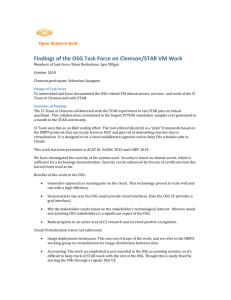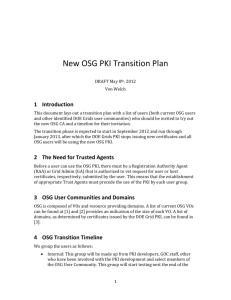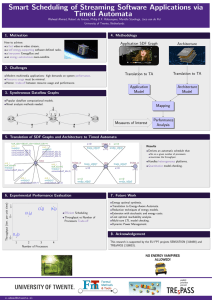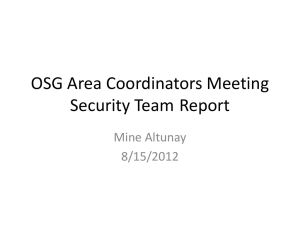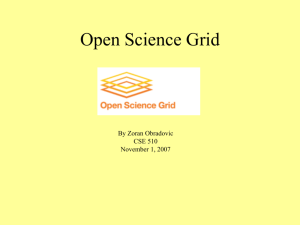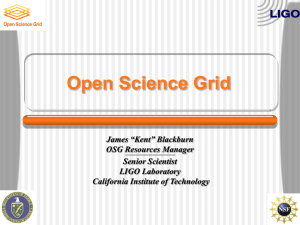to be assigned - TWiki
advertisement
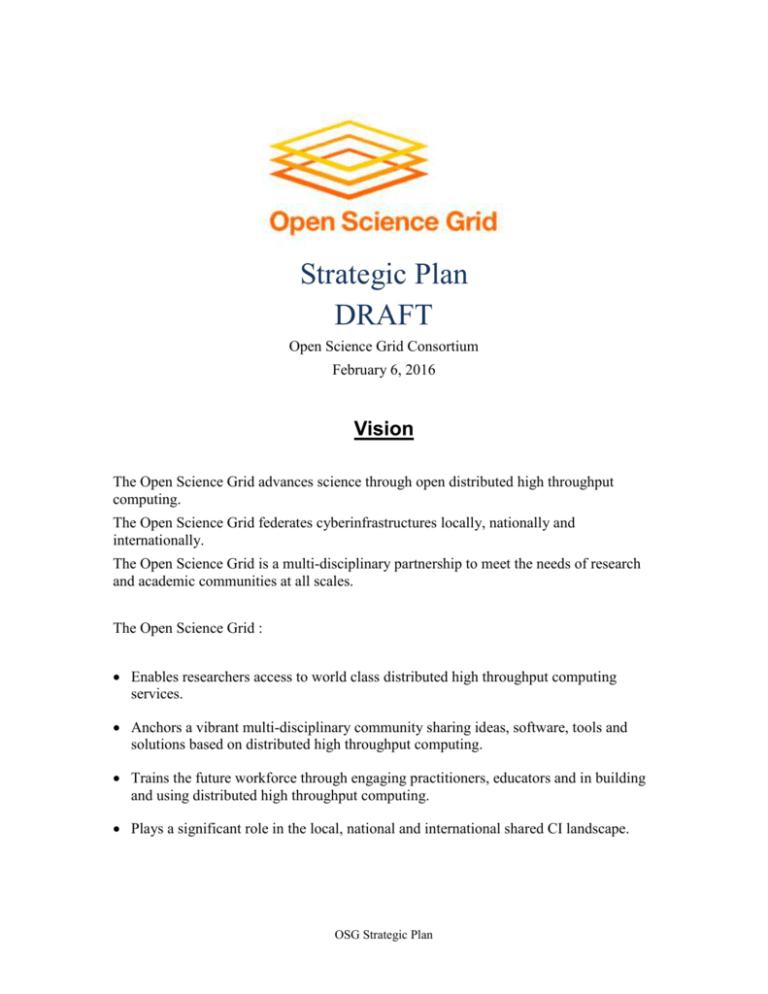
Strategic Plan DRAFT Open Science Grid Consortium February 6, 2016 Vision The Open Science Grid advances science through open distributed high throughput computing. The Open Science Grid federates cyberinfrastructures locally, nationally and internationally. The Open Science Grid is a multi-disciplinary partnership to meet the needs of research and academic communities at all scales. The Open Science Grid : Enables researchers access to world class distributed high throughput computing services. Anchors a vibrant multi-disciplinary community sharing ideas, software, tools and solutions based on distributed high throughput computing. Trains the future workforce through engaging practitioners, educators and in building and using distributed high throughput computing. Plays a significant role in the local, national and international shared CI landscape. OSG Strategic Plan Objectives The members of the OSG consortium have come together based on the common vision of innovation and advancement in science, research and technology achievable through the use and practice of distributed high throughput computing. The objectives of the organization are based on that together federating and sharing their community and organizational services, software and expertise, the members engineer a more productive and effective eco-system not only for themselves, but for other communities that can benefit. OSG aims to: Enhance the outcomes of and innovations from science, research and training through the application of distributed high throughput computing. Manage community driven growth in the scale and reach of the resources federated, the number and diversity of the user communities, and the capabilities and capacities of the services and software. Operate a production quality distributed high throughput computing fabric of services in support of local, regional, national and international communities. o Federate the shared use of heterogeneous resources, including compute, storage, network, cloud, clusters. o Support science and research communities to build, federate and use distributed high throughput computing services and infrastructures. o Provide integrated software solutions for the application and administration of distributed high throughput computing. Evolve technology solutions that support science and research needs from distributed high throughput computing. Engage and educate through consulting services for end-to-end solutions that include distributed high throughput computing. Actions OSG’s objectives are achieved through activities of the OSG program of work executed by the core and satellite projects based on the needs of the consortium members. Specific activities and their goals are planned and acted upon on an annual basis. Activities and goals are re-planned as the needs of the communities change and evolve and as a result of ongoing experience and results. 2 The strategic actions offer a high level snapshot of the activities planned over the next five years to accomplish the objectives that achieve the consortium’s vision. These actions contribute to one of more of the above strategic aims as shown: Actions Objective DRAFT Enhance Science Manage Growth Operate Services Evolve Technologies Engage and Educate Anchor a diverse community of researchers, software developers and operators of computing facilities. Attend and sponsor workshops to disseminate and provide an intellectual hub for the DHTC community. Deploy integrated identity management services. Provide HTC service to the XD-XSEDE community. Extend the Campus reach. Interface to and integrate with advanced networking technologies. Integrate existing services with commercial and scientific cloud resources and services. Maintain a Blueprint of DHTC principles and architecture. Manage the allocation and priority of usage across the shared use of opportunistically used resources. Provide an at-scale testing and evaluation laboratory for distributed high throughput computing. Provide the Virtual Data Toolkit – a set of software solutions for DHTC communities. Reduce time to production for new communities and users Interoperate with EGI Job submission service using overlay batch systems used by all communities Seamlessly move up to 1 Exabyte of data and make it accessible remotely from everywhere. 3 Actions Objective DRAFT Enhance Science Manage Growth Operate Services Evolve Technologies Engage and Educate Help universities build out their own local fabric of shared HTC services to support a local community of students and faculty Provide easily installed by a campus researcher integrated software package. Publish materials that cover best practices in and technical guidance for the use of DHTC technologies. Critical Success Factors Community and user happiness. Improvement in the percentage of activities that complete to the planned time. Number of education events. Number of peer reviewed publications. Number of satellite projects fostered. Number of students who sustain use of or contribute to DHTC. Number of universities using DHTC technologies. Number of users of DHTC technologies. Quality and robustness of the operations services. Reduction in number of errors found after release of VDT. 4 Supporting Material Participants in the OSG List of institutions from the web page Areas of Value The areas of value that are the goal of the Consortium are described in more detail in the OSG document “Value of the Open Science Grid”. In summary the OSG: Supports Collaborative Research from Small to Large Scales. Provides a Sustained US Cyber Infrastructure for Scientists. Contributes to Computer Science and Software Body of Knowledge. Sustains and Enhances US Expertise. Creates an Environment for Opportunistic Computing. Scope of the Strategic Plan The OSG Strategic Plan takes a top down approach of defining the vision, scope, and objectives of the OSG Consortium, based on the charter of the organization. This leads to a set of actions and measures of success that that are implemented “bottom up” by the many areas of funded work and contributions of its members and partners. 5

